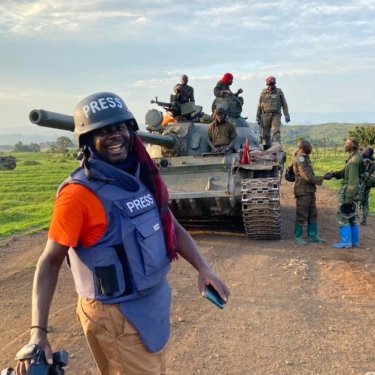Journalists targeted by fighters in eastern DRC’s Nord-Kivu province

Reporters Without Borders (RSF) is alarmed by the situation in the Democratic Republic of Congo’s eastern province of Nord-Kivu, where both government forces and M23 rebels are targeting journalists in the course of their clashes.
La Voix de Mikeno, a community radio station located on a hilltop above the town of Bunagana, has been silent since 13 June, when members of M23, a mainly Tutsi rebel group often alleged to have Rwandan backing, ransacked its premises a few hours after launching an attack on the town.
All that remains of the radio station is the building’s wooden facade and the protected antenna of the Voice of America (VOA). Chairs, transmitters, microphones and sound mixing equipment were all destroyed in the raid. No one was hurt but, fearing further attacks, all of the station’s staff fled to a nearby town and to Uganda. Bunagana is now a ghost town.
In the days prior to the raid, La Voix de Mikeno had only been transmitting news programmes provided by the US broadcaster, VOA, which were one of the rare sources of news available to the local population since the fighting intensified in Nord-Kivu.
“Congolese journalists and media are becoming both targets and collateral victims of the clashes taking place in the eastern DRC,” said Arnaud Froger, the head of RSF’s Africa desk. “The threat level is such that the worst is to be feared if nothing is done to prevent the attacks and death threats. We call on the Congolese government to do everything possible to ensure the safety of journalists and to systematically prosecute those who attack them, regardless of the camp to which they belong.”
The fighting has intensified in Nord-Kivu since late 2021, when M23 took up arms again on the grounds that the Congolese authorities had not adhered to an agreement to demobilise and reinsert its fighters. The Congolese authorities meanwhile accuse Rwanda of wanting to occupy the region and of backing M23. And the province’s journalists are increasingly being accused of siding with one or the other camp.
VOA Swahili reporter Auster Malivika fears being the target of rebel attacks ever since an M23 communiqué in May accused him of being a “DRC Armed Forces reporter” because he had been covering the conflict by following the government’s forces.
Three other journalists contacted by RSF – Stany Bujakera, a reporter for Jeune Afrique, Reuters and Actualité.cd, Steve Wembi, a freelance journalist for the New York Times, and John Lungila, a journalist with the public television channel Educ TV – are being subjected to cyber-harassment and frequent death threats by Congolese government supporters, who accuse them of having become “M23 mouthpieces.”
The photos of the three journalists accompanied by the words, “If today I was asked to kill three corrupt Congolese journalists, I would kill these three journalists,” were posted in a tweet under a pseudonym on the @ZacharieMbaya_1 account, which has more than 10,000 followers. The tweet has been deleted.
RSF and its Congolese partner, Journalist in Danger (JED), have for years been calling for an overhaul of the DRC’s oppressive and obsolete 1996 media law, for a moratorium on arrests of journalists, for the reinforcement of regulatory and self-regulatory mechanisms, and for the creation of a national mechanism for protecting journalists.
During last January’s national conference on the media, the authorities promised reforms designed to improve what is a very hostile environment for Congolese journalists, but the reforms have not yet materialised.
